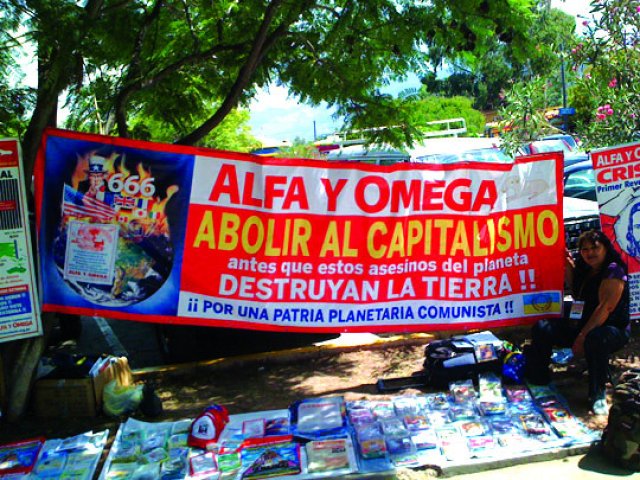
Bolivia's World People's Summit on Climate Change and the Rights of Mother Earth was radical, inspiring, uncompromising and exactly what was needed.
Up to 30,000 people from six continents took part in the summit, which was held in the Bolivian city of Cochabamba from April 19 to 22.
The huge oil spill from a BP rig in the Gulf of Mexico underscores the summit’s significance. About 800,000 litres of oil are spewing out a day. The company admits it may not be able to stop the leak for weeks — or even months.
Oil companies like BP are among the most powerful organisations on the planet. Seven of the 10 richest companies worldwide are oil giants.
If we don’t end the system that rewards such ecological destruction, capitalism will make the Earth uninhabitable.
The huge protests outside December's failed Copenhagen climate summit showed that a global movement for real climate action had emerged. Cochabamba showed the movement is getting stronger and more ambitious.
The final “people's agreement” adopted by the summit — the Cochabamba protocol — warned that climate change puts the future of humanity in danger. It noted that the 2°C average warming target favoured by the rich countries would lead to mass species extinctions, severe water shortages and rising sea levels.
A 2°C target is the official goal of countries supporting the Copenhagen Accord — a plan announced by wealthy nations at Copenhagen and endorsed by Australia's Prime Minister Kevin Rudd.
However, the emissions cuts pledged under the accord are so small it would actually mean a catastrophic 3°C rise or more, said the Potsdam Institute for Climate Impact Research.
Unlike the Copenhagen fiasco, the climate activists at Cochabamba took aim at the real culprits for global warming.
The protocol said: “The corporations and governments of the so-called ‘developed’ countries, in complicity with a segment of the scientific community, have led us to discuss climate change as a problem limited to the rise in temperature without questioning the cause, which is the capitalist system.”
Capitalism is the problem because it “has imposed on us a logic of competition, progress and limitless growth. This regime of production and consumption seeks profit without limits, separating human beings from nature and imposing a logic of domination upon nature, transforming everything into commodities: water, earth, the human genome, ancestral cultures, biodiversity, justice, ethics, the rights of peoples, and life itself.”
The existing system is incompatible with a safe climate. It converts the Earth “into a source of raw materials, and human beings into consumers and a means of production, into people that are seen as valuable only for what they own, and not for what they are.”
The call from Cochabamba is unmistakable. Global warming is not just an “environmental” concern. To save the planet from dangerous climate change the climate movement must also stand for radical social change and grassroots democracy.
“Humanity confronts a great dilemma: to continue on the path of capitalism, depredation and death, or to choose the path of harmony with nature and respect for life”, the protocol said.
“It is imperative that we forge a new system that restores harmony with nature and among human beings. And in order for there to be balance with nature, there must first be equity among human beings.”
The summit also adopted a Universal Declaration of the Rights of Mother Earth that will be submitted to the United Nations for approval. The declaration calls to “establish … measures to prevent human activities from causing species extinction, the destruction of ecosystems or the disruption of ecological cycles” and to “promote economic systems that are in harmony with Mother Earth”.
The conference gives hope of a coming together of the revolutionary movements in Latin America, the social movements of the poor in the global South and the grassroots climate movement in the North.
This kind of international alliance is essential to defeat the global elites who will stop at nothing to put their profits ahead of people and planet.
Also, the Cochabamba summit underscores the need for active solidarity with the revolutions in Bolivia, Venezuela, Cuba and elsewhere in Latin America, which are under attack from US imperialism. A setback for the Latin American left will be a setback for the world climate justice movement too.
Unsurprisingly, Australia was singled out for criticism during the summit. The Bolivian newspaper Cambio ran a special feature that listed Australia alongside the US and China as among the world's worst polluters.
As the Cochabamba summit closed, the Rudd government announced it would delay its centrepiece climate policy, the Carbon Pollution Reduction Scheme, until 2013.
While opposition leader Tony Abbott (backed by the well-funded frauds who comprise the climate change denial lobby) portrayed the CPRS as a “deep green” assault on capitalism and the modern world, in reality it was more about “compensating” the big polluters with taxpayer’s money than cutting emissions.
Its market-dependent mechanisms would not have achieved even the woefully inadequate projected 5% cut in emissions.
In 2007, Rudd called climate change “the great moral challenge of our generation”. Now, as the federal election approaches, he has ditched any pretence of action so as to play “how small is your climate change policy” with the opposition.
In his message to the Cochabamba summit, Uruguayan writer Eduardo Galeano, author of The Open Veins of Latin America, could well have had Rudd in mind: "Besides, we are, above all, fed up with the hypocrisy of rich countries, which are leaving us without a habitable planet while making pompous speeches to cover up their heist.”
Comments
stuartmunckton@... replied on Permalink
peter.g.boyle@g... replied on Permalink
Simon Butler replied on Permalink